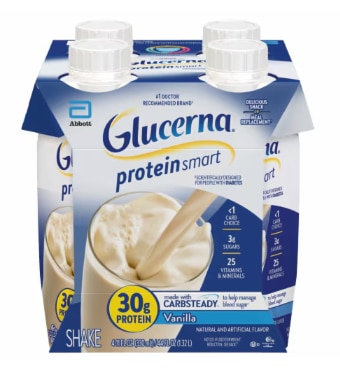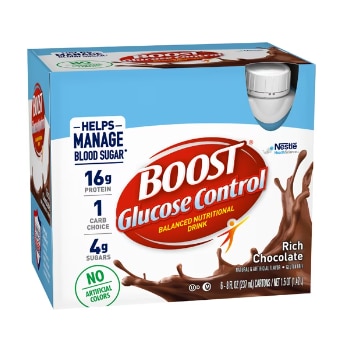For people living with diabetes, managing blood sugars is a constant balancing act every day. Eating a balanced diet is key for maintaining steady blood sugar levels and understanding the role of different nutrients such as carbohydrates, protein and fat can make a significant difference in maintaining consistent blood sugar control.
Protein is a powerful macronutrient that can significantly influence blood sugar balance. By understanding how protein works within the body, people with diabetes can make informed decisions around food choices to help stabilize blood sugar levels and improve overall well-being.
Let’s delve into the science behind protein and discover how it can be a valuable tool in your diabetes management plan.
 The role of carbohydrates, protein and fat
The role of carbohydrates, protein and fat
There are three main macronutrients to be aware of: carbohydrates, protein and fat.
One of the best ways to manage your blood sugar is to eat a balanced diet composed of all three of these macronutrients. Carbohydrates have the fastest and most significant impact on blood sugar, whereas the impact of protein and fat is more delayed and less obvious.
When you consume carbohydrates, your body breaks them down into glucose which is the primary source of energy for your cells. This glucose is then absorbed into your bloodstream, causing blood sugar levels to rise. To regulate blood sugar, you need insulin which is the hormone that helps glucose enter your cells so that it can then be used as energy.
Fats, on the other hand, do not directly affect blood sugar levels. Unlike carbohydrates, which break down into glucose and raise blood sugar, fats are metabolized differently. Fats can help slow down the digestion process. This means that fats are absorbed more gradually, helping to prevent large spikes in blood sugar levels.
Unlike fats and carbohydrates, protein is made up of amino acids. They are considered the building blocks for tissues, muscles and enzymes. Protein plays a crucial role in many bodily functions, but it doesn’t directly convert into glucose like carbohydrates and is digested more slowly. This slower digestion means a gradual release of glucose into the bloodstream, helping to prevent large blood sugar fluctuations. Additionally, protein can help slow the absorption of carbohydrates, further contributing to steadier blood sugar levels.
Protein’s impact on blood sugar
Protein plays a crucial role in blood sugar management. By slowing down the absorption of carbohydrates, protein helps prevent rapid spikes in blood sugar levels. This slower digestion process allows for a steadier release of glucose into the bloodstream, contributing to improved blood sugar control.
Additionally, protein has been shown to enhance insulin sensitivity, meaning your body can use insulin more effectively to transport glucose into cells.
This combined effect of slowing carbohydrate absorption and improving insulin sensitivity makes protein an invaluable tool for individuals with diabetes or those aiming to maintain stable blood sugar levels.
Incorporating protein into your diet
Now that you understand how protein can help with the consistency of your blood sugar, let’s explore some protein-rich foods.
Lean proteins
- Poultry: Chicken and turkey are excellent choices of animal-based lean protein. Opt for skinless options to reduce fat intake.
- Lean beef or pork: Look for cuts with loin or round in the name which are leaner while still being a great protein source.
- Fish: Packed with omega-3 fatty acids which are heart-healthy, fish like salmon, tuna and mackerel are also fantastic protein sources.
- Eggs: Eggs are a versatile and affordable option that are rich in protein and other essential nutrients.
Plant-based proteins
- Legumes: Beans, lentils and chickpeas are not only high in protein, but also packed with fiber, which helps control blood sugar.
- Tofu and tempeh: Tofu and tempeh are soy-based proteins that offer a good amount of protein and are versatile in cooking.
- Nuts and seeds: Nuts and seeds are great sources of protein and healthy fats.
Dairy
- Greek yogurt: Greek yogurt has at least twice as much protein as regular yogurt and can be a satisfying and nutritious snack. Look for options with lower amounts of added sugar or choose plain Greek yogurt and add your own toppings such as fruit and nuts.
- Cheese: While it’s important to watch portion sizes due to fat content, cheese contains protein and can be enjoyed in moderation as part of a balanced diet.
Other protein sources
- Protein powders: Protein powders are a quick and convenient way to help boost protein intake. Protein powders are often made with whey protein but they also come in plant-based options made with ingredients like pea protein or soy protein.
How much protein should I eat?
The U.S. Dietary Guidelines for Americans recommends that anywhere from 10-35% of calories each day should come from protein. For someone eating 2,000 calories daily, this would be equivalent to 50-175 grams of protein per day – quite a wide range! To determine your specific needs and what’s best for you, consider consulting with a registered dietitian.
Beyond blood sugar: More03 protein benefits & considerations
Protein benefits go far beyond blood sugar control. It can also be a valuable tool for weight management as it promotes satiety, helping you feel fuller for longer and potentially reducing overall calorie intake.
Protein also plays a crucial role in building and repairing tissues, supporting muscle mass and boosting metabolism. Additionally, protein supports immune function and can help maintain healthy skin, hair, and nails.
While protein is clearly very beneficial, it’s important to remember that individual protein needs vary and you should always consult with a healthcare professional or registered dietitian to determine the optimal protein intake for your specific health goals and conditions.
In summary
Incorporating adequate protein into your diet is a powerful strategy for managing blood sugar levels. By slowing down the absorption of carbohydrates and improving insulin sensitivity, protein helps balance blood sugars while also helping to keep you full and energized.
Whether you’re managing diabetes or simply looking to optimize your overall health, making protein a priority is a step in the right direction. Remember, a balanced diet is key and while protein is essential, it’s important to combine it with a variety of nutrient-rich foods, including whole grains, fruits and vegetables and to consider the overall nutritional value of your food choices while being mindful of portion sizes.
Featured Products



The post Protein and Diabetes: Balancing Your Plate for Blood Sugar Control first appeared on The Upside by Vitacost.com.

